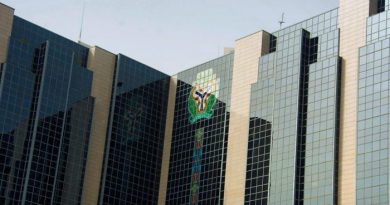Nigeria Has Become Africa’s Money-losing Machine, Forbes Magazine
In five years, the Nigeria ETF has blown up, now down over 74.5%.
Equity investment between 2013 and 2018 has fallen from around $2.9 billion in 2013 to just $139 million in 2018.
Want to lose money in one of Africa’s biggest markets? Put it to work in Nigeria.
Despite sitting on nearly 40 billion barrels of proven oil reserves and over $48 billion worth of investment opportunities in the oil and gas sector, Africa’s largest economy is mired in problems with big corporate investors as president Muhammadu Buhari readies his second-term after a swearing-in ceremony scheduled for May 29.
Nigeria’s stock index is down 0.4% year-to-date while emerging markets are up 2.3% and the MSCI Frontier Markets 100 is up 10.2%.
As one of the better known, investable African equity markets, anyone who tried their luck with the Global X Nigeria (NGE) exchange-traded fund is down 27.7% over the last 12 months. In five years, the Nigeria ETF has blown up, now down over 74.5%. Frontier and emerging indexes are better than Nigeria. It’s also worse than South Africa, Africa’s largest stock market, and Egypt, Africa’s second largest.
In terms of foreign direct investment, back in 2013 inflows totaled $5.6 billion, most of it in the telecom and energy sectors. Last year, Nigeria’s FDI flattened to $2 billion. Equity investment between 2013 and 2018 has fallen from around $2.9 billion in 2013 to just $139 million in 2018. In the last quarter of 2018, there was the first net pullout of equity capital since records began under the current accounting methodology in 2008, according to data compiled by The Economist Intelligence Unit (EIU).
Nigeria is Africa’s largest economy in terms of nominal GDP. South Africa comes in second, even though its GDP per capita is roughly five times that of Nigeria.
It’s Nigeria’s abundant commodity resources that make it so big. But it’s Nigeria’s government that keeps it from getting bigger, and richer.
“Nigeria has never been a particularly business-friendly place,” says David Bruckmeier, a sub-Saharan business intelligence analyst at London-based political risk firm AKE Group. “Outright hostile action against major foreign investors is rare, but bureaucracy, pervasive corruption, an unfavorable tax system and disputes with investors hurt investment,” he says.
Nigeria’s GDP contracted 13.8% in the first quarter, wiping out last year’s economic gains.
The only country to do that of late is Venezuela. And like Venezuela, Nigeria has also dealt with blackouts in the power grid—six of them this year.
“Electricity price controls are a big problem,” says Benedict Craven, a Nigeria analyst for the EIU. “The private sector is given little incentive to invest.”
According to USAID, the main U.S. government international aid organization, Nigeria has the potential to generate over 12,000 megawatts of electricity daily. On most days, it generates around 4,000 megawatts.
A March 25 documentary by the BBC, Africa Eye, said half of Nigeria’s population has no access to electricity and those that do face daily power cuts that can last for hours.
This is the kind of stuff that happens in Venezuela, a country facing U.S. sanctions, three years of economic depression and a government with dwindling support. Unlike Venezuela, Nigeria is the eighth-largest recipient of international aid. And the second largest in Africa.
Nigeria has Africa’s largest gas reserves, some 190 trillion cubic feet. Yet for all of this great oil and gas wealth, the country’s electrical grid is a charade.
“Perhaps most worryingly of all, the damage being done by a range of investor disputes where basic property and contractual rights are being violated seems to be on the increase,” says Shanker Singham, CEO of The Competere Group, a legal and trade advisory firm in London. “The erosion of Nigeria’s commitment to the rule of law is highly worrying, both from a political and an economic perspective,” Singham says.
The most notable disputes are with South Africa telecom MTN Group, an energy project with Process & Industrial Development (P&ID), and a hydroelectric contract between Sunrise Power and Chinese investors.
In the P&ID case, a London court in January 2017 said Nigeria owed the company $6.6 billion plus interest, a significant percentage of Nigeria’s $44 billion of foreign currency reserves.
Both P&ID and Sunrise have been a thorn in Nigeria’s side, with Nigeria’s government on one side saying they were duped by P&ID as far back as 2012, and courts ruling against their defense on the other. So far, these two disputes alone have easily led to more than $11 billion in international legal awards against the Buhari government.
As for the P&ID saga, the company’s main complaint relates to the government’s failure to complete a pipeline and other critical infrastructure. The project would have generated annually up to 2,000 megawatts of electricity for residential and commercial use. The company initiated arbitration proceedings in 2012, the standard legal set up for international investor disputes.
“Whether its calculations regarding its supposed investments and foregone profits are plausible is a different matter—but the government never made any effort to challenge them anyway. Nor is it surprising that Nigeria failed to show up to court hearings in the case,” says AKE Group’s Bruckmeier. “This is exemplary of the unprofessional and nonchalant attitude Nigeria often displays in such matters.”
P&ID is in limbo.
“We are well aware of the government’s efforts to characterize P&ID, and its founders, as frauds,” Brendan Cahill, the company’s founder, told Nigerian daily This Day Live on May 15 in a Q&A published on its website.
“The arbitrators in London spent five years carefully reviewing the written agreement and all the facts surrounding the deal, and in the end, they unanimously concluded that Nigeria was to blame for the deal’s collapse and had to pay damages to P&ID,” he says. “Not once during those five years did Nigeria present the courts with any evidence that there had been some kind of fraud—because there wasn’t one.”
That battle continues in the courts.
Then there is Sunrise Power.
Sunrise recently brought Nigeria and its Chinese partners before the International Chamber of Commerce in Paris. Nigeria faces another $2.3 billion fine in arbitration over breach of contract. Sunrise was behind the Mambilla hydroelectric dam project. It would have been Nigeria’s biggest hydropower plant, capable of generating 3,050 megawatts of power.
There have been no new developments in the arbitration case as of May 20.
Nigeria’s energy woes are costing it a fortune. It is also making some bond analysts nervous , judging by an article in the Financial Times recently saying Nigeria was facing “a looming external debt crisis.” Its external debt increased $12 billion in three years, going from $10 billion to $22 billion between 2015 and 2018.
“Their debt service eats up 60% of their government revenue and is rising according to the IMF,” says Andrew Roche, managing partner at Finexem in Paris. “If they do not raise revenue, and if they can’t continue borrowing for whatever reason, then we are looking at a potential default or at least a period of dried up financing for Nigeria.”
The economy is expected to grow at just 2% this year, according to Fitch. They have Nigeria’s credit outlook as stable. Its bonds are rated B+, a low-tier speculative grade credit.
Nigeria’s general government debt is expected to rise to 292% of revenue, well above the historical B-rated credit, thanks in part to the government’s lack of progress on raising government revenue. Debt-to-GDP is below 30%. But interest payments on the debt owed to bondholders—which includes local banks—is estimated to be around 20% of general government revenue, more than twice that of average B-rated countries.
“Nigeria’s markets are broken, but not in the sense that they don’t work,” says Jan Dehn, head of research for the Ashmore Group, an emerging and frontier market investment firm with holdings in Nigerian stocks and dollar-denominated debt. “Opportunities rise, get exploited, and then they end,” he says, noting that Nigeria was kicked out of the Barclays global bond index due to capital controls in 2015. Much of Wall Street’s institutional client base left.
“I’ve had positive experiences with officials at the central bank and in the banks,” Dehn says. “But the quality of the (federal) government varies.”
Buhari was reelected in February. Investors hope he can signal a new direction for economic policy in the months ahead.
With regards to Nigeria’s investor disputes with the two energy projects, Singham estimates that the P&ID dispute can cost Nigeria nearly 40% of their foreign reserves, calling it “a significant threat to investor confidence” if not settled. Nigeria has yet to pay the settlement.
“P&ID is a bigger deal than MMT and Sunrise,” he says in a phone interview from London. “If I was the Nigerian government trying to signal that we were back in business, I would do something about that case first,” he says.
Global capital moves quickly. These little signals can be a powerful mover in a country that most investors believe is heading in the wrong direction. On the other hand, there is a consensus that Nigeria can transform itself pretty quickly.
“Is there the political will in a new Buhari government? It might just be more of the same,” says Singham. “Change is not always about one leader. When you want to get a country to improve, you need to give oxygen to the reform-minded people in the country. I think we at least have something we can work with Buhar




